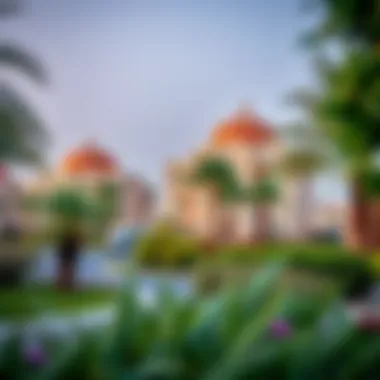Discovering Homes for Life in Dubai's Real Estate Market


Intro
Dubai's real estate landscape is a vibrant tapestry woven from a rich history and a bustling contemporary society. Amidst this dynamic environment lies the critical concept of homes for life—properties that don’t just serve as temporary residences but are chosen for long-term stability and investment potential. This article seeks to uncover the multifaceted nature of Dubai's real estate, guiding individuals through the complexities of making informed choices in this fast-paced market.
As buyers set their sights on Dubai, they engage in a unique mix of luxury, diversity, and opportunity. It’s not merely about finding a roof over one’s head but about investing in a lifestyle, a community, and a future. With new projects continually reshaping the city, understanding current trends and future predictions becomes paramount for both investors and homebuyers.
Real estate in Dubai is characterized by its adaptability and innovation. From soaring skyscrapers to tranquil villas, the options are vast, appealing to a wide range of clients. Yet, hidden beneath these choices lies the necessity for thorough research and careful planning. Whether one is an investor looking to penetrate this lucrative market or a family seeking their forever home, grasping the nuances of property ownership in Dubai can make all the difference.
In the sections that follow, we will delve into the market overview, current trends, and investment opportunities that shape this unique market. With insights tailored for investors, agents, homebuyers, and managers, we aim to illuminate the path through Dubai’s real estate sector, ensuring our readers are equipped with the necessary knowledge to make optimal decisions.
"Investing in a home is not just about bricks and mortar; it's about securing a life within a thriving community."
Understanding the Concept of Homes for Life
When it comes to the bustling landscape of Dubai's real estate, the phrase homes for life carries weight. It's not just about purchasing a property; it's about making a long-term commitment to a place, a community, and a lifestyle. This concept highlights the significance of looking beyond mere bricks and mortar, focusing instead on creating a stable living environment that caters to personal and family needs over time.
The idea of a home for life encompasses various aspects that potential buyers must consider. First, it's about identifying a location that feels right, one that resonates with the family’s social and cultural values. Whether it's the vibrant life of Dubai Marina or the serene vibe of Arabian Ranches, each area offers a unique lifestyle that can significantly influence one’s happiness and sense of belonging.
Moreover, a home for life is not just a financial investment but also an emotional one. We often cherish memories made in spaces we call home, and as such, finding a property that feels right can lead to lifelong satisfaction. This notion urges buyers to think not just about their immediate lifestyle needs but envision how their circumstances may evolve over the years — from small children to hosting family gatherings or even accommodating elderly relatives.
Defining Homes for Life
The term homes for life can be defined as properties that serve the occupant's needs over the long haul. In the context of Dubai's ever-evolving real estate market, this definition invites a broad spectrum of considerations. These might include:
- Location: Proximity to schools, healthcare facilities, and public transport. It also includes the community vibe, whether it's vibrant or tranquil.
- Space Flexibility: The home should accommodate changing lifestyles, perhaps with extra rooms for a growing family or flexible spaces that can be repurposed.
- Access to Amenities: A home is not just the physical structure; it involves ease of access to parks, shopping areas, or recreational facilities, thus contributing to a fulfilling life.
In Dubai, thriving neighborhoods are designed with these factors in mind, often featuring a mix of residential and commercial spaces that cater to diverse preferences. So, when looking at properties, buyers should assess not only current needs but also future aspirations.
The Relevance of Permanent Residency
Permanent residency plays a crucial part in solidifying the concept of homes for life. Owning a property in Dubai often links closely with residency rights that facilitate a stable living situation. For many, becoming a permanent resident means:
- Security: It offers the peace of mind that comes from owning in a city renowned for its safety and world-class amenities.
- Long-term Investment: Committing to a residence allows buyers to not just have a place to live but to also benefit from potential appreciation in property value.
- Community Roots: Owning property can foster deeper ties within the community due to a stable presence and investment in local affairs.
As Dubai continues to evolve, the importance of permanent residency in relation to homes for life becomes increasingly evident. With the city positioning itself as a global hub of trade and culture, the desire to plant roots becomes more appealing. Prospective buyers need to weigh these aspects carefully as they embark on their journey through Dubai's real estate market.
In a city where dreams meet reality, understanding the value of a home for life is essential for making wise investment choices.
The Dubai Real Estate Landscape
The Dubai real estate landscape is a bustling tapestry, reflecting the city's dynamic growth and diverse investment opportunities. It offers a wealth of properties ranging from opulent high-rises to quaint villas. Understanding this landscape is crucial for anyone looking to make informed decisions about property ownership or investment in this vibrant market. The rapid development in Dubai can be attributed to several factors, including government initiatives aimed at easing foreign investment and a robust tourism sector. Comprehensively navigating these elements can position buyers and investors effectively for the long haul.
Current Market Trends
In recent years, the Dubai real estate market has observed notable shifts, mirroring broader economic trends. Investors and homebuyers are leaning towards sustainable developments, reflecting a global push for eco-friendly practices. According to a report from the Dubai Land Department, there was a significant increase in real estate transactions, with property values showing modest growth.
Here are some of the key trends shaping the market today:
- Increased Demand for Flexible Living Spaces: The pandemic shifted preferences toward properties that can accommodate work-from-home setups. Open layouts and extra rooms for home offices are now sought after.
- Rise in Off-Plan Projects: Investors are increasingly eyeing off-plan developments due to potentially higher return rates. Prominent developers are launching new projects in emerging areas, promising attractive payment plans.
- Middle-Income Housing: The demand for affordable housing is surging as more people aim to invest in real estate rather than renting. This segment offers great opportunities for young professionals and families.
Market analysts predict that this trend will continue, emphasizing the need for both buyers and investors to keep a keen eye on emerging neighborhoods.
Key Players in the Market
The Dubai real estate market is characterized by a mix of established giants and inventive newcomers, all vying for a piece of the vibrant landscape. Key players in this arena include not only property developers but also real estate agencies and investment firms that facilitate transactions.
Some notable companies include:
- Emaar Properties: Known for iconic projects like the Burj Khalifa, Emaar has a solid reputation for delivering quality developments.
- DAMAC Properties: Recognized for luxury properties, DAMAC has attracted investors looking for high-end residential options.
- Property Finder: A leading real estate platform connecting buyers to agents, showcasing a range of properties in Dubai.
- Bayut: Another property portal that helps users find residential and commercial listings across Dubai.
The competition among these players drives innovation and better services, ultimately benefiting the consumers. Moreover, many agencies pride themselves on local knowledge, which can prove invaluable in navigating the complexities of buying property in a foreign market. Each player contributes to the growth of a market that is anything but static, making it essential for buyers and investors to stay informed about the latest developments and shifts.
"The key to successful investing in Dubai real estate is being in the right place at the right time. Knowledge and timing are everything."
As you delve into Dubai’s real estate market, understanding the landscape will equip you with the knowledge required to make decisions that align with your long-term lifestyle or investment goals.
Types of Properties Available
In the ever-evolving landscape of Dubai's real estate, understanding the types of properties available is essential for prospective buyers and investors. The variety—including residential properties, luxury developments, and commercial estates—caters to a broad spectrum of needs, preferences, and investment strategies. This exploration of property types aims to highlight the unique benefits they offer in contributing to a balanced lifestyle and successful investments.
Residential Properties
Residential properties in Dubai come in all shapes and sizes—from cozy apartments in bustling neighborhoods to sprawling villas in serene surroundings. For anyone looking to make Dubai their home, these properties are the first consideration.
- Diverse Options: Choices span from high-rise condominiums in Dubai Marina to gated villas in Arabian Ranches. Such diversity allows individuals and families to choose properties that best fit their lifestyle and budget.
- Community Feel: Neighborhoods like Jumeirah offer a vibrant community spirit. Residents can enjoy parks, schools, and community centers, enhancing their quality of life.
- Investment Potential: Residential properties often appreciate over time, providing a solid return on investment. Many buyers also find rental opportunities appealing, tapping into the thriving expat market.
"Investing in residential properties in Dubai can lead to long-lasting benefits, especially with the increasing demand for quality housing" – local real estate analysts offer this perspective when discussing market trends.
Luxury Developments
Dubai is synonymous with luxury, and its real estate market reflects this. Luxury developments boast opulence, state-of-the-art facilities, and breathtaking views—an attractive proposition for affluent buyers.
- Exclusive Amenities: Many luxury properties feature amenities such as infinity pools, private spas, and concierge services, making everyday living feel like a vacation.
- Prestige and Status: Owning a property in areas like Palm Jumeirah or Downtown Dubai often carries a certain prestige, appealing to high-net-worth individuals.
- Strong Resale Value: Luxury developments generally retain their value well, making them sound investments. Properties in prime locations are particularly sought after, ensuring they hold or increase in value over time.
Commercial Estates
Investing in commercial estates represents another lucrative avenue in Dubai's vibrant real estate scene. These properties cater to businesses ranging from small startups to large corporations.
- Prime Locations: Areas like the Dubai International Financial Centre (DIFC) or Business Bay are hubs for businesses, driving demand for office spaces.
- Rental Income: These properties can provide steady income streams from commercial leases. Savvy investors often see commercial real estate as a pathway to financial stability and growth.
- Market Resilience: Despite economic fluctuations, the demand for commercial spaces often remains robust, underscoring a potentially lower risk profile compared to residential properties.
In summary, the types of properties available in Dubai's market cater to diverse needs and aspirations. Whether one seeks a tranquil family home, a luxurious lifestyle, or a commercial venture, understanding these key categories can significantly influence one’s investment journey.
Investment Strategies in Dubai


When venturing into the realm of Dubai's real estate, understanding the right investment strategies is pivotal. The dynamic and ever-evolving market offers both opportunities and challenges. For investors, having a solid strategy can be the difference between a noteworthy success and a costly misadventure. This section explores these strategies, considering the diverse aspects involved in property investment in this vibrant city.
Long-Term vs. Short-Term Investments
Choosing between long-term and short-term investments in Dubai real estate can feel like picking between a well-aged wine and a brand new bottle. Each has its merits, but which path is the right one for your investment goals?
- Long-Term Investments: Investing for the long haul means a focus on stability and growth over time. Properties in established neighborhoods often yield slower, steadier appreciation but set the stage for a reliable income stream. For example, areas like Jumeirah and Downtown Dubai offer seasoned investments. Investing in a property here not only promises a beautiful place to live but also assures consistent rental yields. Furthermore, such properties can often withstand market fluctuations better than newer developments.
- Short-Term Investments: On the flip side, a short-term strategy is all about quick returns. Flipping properties or investing in up-and-coming neighborhoods can result in significant profits. However, this comes with its own set of risks. It's crucial to stay ahead of market trends, recognize potential growth areas, and make swift decisions. Neighborhoods like Dubai Marina and Business Bay sometimes provide ripe opportunities for short-term gains, but investors must be acutely aware of the necessity for quick renovations and effective marketing to sell.
Understanding ROI and Capital Appreciation
Understanding Return on Investment (ROI) and capital appreciation is non-negotiable for serious investors. These concepts are the heartbeat of property finance and should always be at the forefront of investment analyses.
- Return on Investment (ROI): ROI is a key measure that indicates the efficiency of an investment. To calculate this, you can use the formula:ROI = (Net Profit / Cost of Investment) x 100
This measure helps investors assess the potential benefits of a property before diving in. For instance, if a property costs 1 million AED and generates a net profit of 200,000 AED annually, your ROI stands at a cool 20%. In the tightly-knit market of Dubai, investors often aim for a minimum of 8% ROI to consider their investment worthwhile.
- Capital Appreciation: Unlike ROI, capital appreciation focuses on the overall increase in a property's value over time. In Dubai, where the market can shift quickly, keeping an eye on areas set for development can lead to impressive capital gains. For instance, emerging locations such as Dubai South have shown significant potential, with estimates indicating property values might see a substantial uptick in line with Dubai's strategic growth plans.
Understanding both ROI and capital appreciation not only equips investors with the knowledge needed to make informed choices but also helps in foreseeing potential market movements. This meticulous attention to detail plays a critical role in ensuring that investments not only flourish but also adapt to the shifting sands of Dubai's real estate scene.
As the market continues to evolve, staying on top of these investment strategies will remain crucial to carving out a niche within Dubai's promising real estate landscape.
"Investing in Dubai's real estate is not just about properties; it’s about understanding dynamics and anticipating the future."
In summary, whether you lean towards long-term stability or short-term gains, a solid foundation in both ROI and capital appreciation can equip you with the insights needed to make sound decisions. The pulsating heart of Dubai's real estate waits for astute investors ready to embark on their journey.
Legal Considerations for Buyers
Navigating through the real estate waters in Dubai involves more than just finding the right property. It’s like sailing a ship; you need to know the currents and tides, and unfortunately, failing to adhere to the legal standards can leave you high and dry. This section dives into two critical aspects: understanding ownership rights and the regulatory frameworks that govern property transactions in the city. As a prospective buyer, staying informed about these legal intricacies is vital to safeguarding your investment and ensuring a smooth transaction.
Understanding Ownership Rights
In Dubai's real estate landscape, understanding your ownership rights is akin to knowing the rules of a game before playing. The system of ownership can be complex, and it’s essential to grasp how these rights affect not only your property purchase but also your overall experience as a property owner.
Dubai offers various types of ownership that can be classified broadly into freehold and leasehold. Freehold ownership allows you to have complete control over your property, giving you the right to sell, rent, or even bequeath it as you wish. On the flip side, leasehold means you own the property for a certain period, often up to 99 years, after which it typically reverts to the original owner.
Some key points to consider:
- Freehold Areas: Predominantly located in prime locations, such as Downtown Dubai and Palm Jumeirah.
- Leasehold Areas: More common in older developments or for properties owned by the government.
- Off-Plan Purchases: When purchasing off-plan, it's crucial to understand rights related to project completion and developer obligations.
Ignorance isn't bliss when it comes to ownership rights. Ensure you conduct thorough research, perhaps consult a legal expert, or even chat with those who’ve walked this path before you. Remember, knowledge can save you from costly headaches down the line.
Navigating Regulatory Frameworks
The next piece of the legal puzzle centers around the regulatory frameworks that dictate how real estate operates in Dubai. Think of it as the rulebook that all players in the market must abide by. Understanding these regulations can seem daunting, yet it’s an essential part of making sound investments.
Here are some pivotal aspects to keep in mind:
- Dubai Land Department (DLD): The main body responsible for regulating real estate ownership and transactions. Registering your property with the DLD grants you legal ownership.
- Real Estate Regulatory Agency (RERA): Enforces regulations and protects both buyers and sellers. They have guidelines you must follow, especially in off-plan transactions.
- Escrow Accounts: Many developers must use escrow accounts for off-plan sales to ensure that your money is safeguarded until the project is completed, minimizing risks of non-completion.
"Adhering to the regulations is not just a legal must; it's the bedrock of trust in real estate transactions."
As you explore properties, familiarize yourself with these frameworks. It’s wise not to go it alone; consider hiring a real estate lawyer who understands the ins and outs of the local laws. Getting caught off guard can be a nasty surprise, leaving you in more than a bit of a pickle.
For more information on regulations and ownership rights, you may visit the Dubai Land Department and the Real Estate Regulatory Agency.
Taking these steps can pave the way for a successful venture into owning a home in this vibrant city.
Lifestyle Implications of Property Ownership
Ownership of property in Dubai can be a game-changer, altering not just your living arrangements but your entire lifestyle. The city, with its glittering skyline and world-class facilities, offers an array of opportunities that come with owning a home. Understanding these implications is key for any investor or homebuyer.
Community and Social Integration
One of the most profound benefits of property ownership is the sense of belonging it fosters. When you own a home, you become a part of a community, not merely an occupant of a space. This community ties those in it closer, promoting interactions through shared amenities and communal spaces. In Dubai, neighborhoods often cater to various lifestyles, whether it's a high-rise in Dubai Marina or townhouses in Arabian Ranches. Each area has its own unique atmosphere and social fabric.
- Neighborhood Events: Many communities host events—be it farmers’ markets or festive gatherings—which provide residents with opportunities to connect. These social events can enhance your lifestyle by engendering friendships and networks that can be invaluable personally and professionally.
- Cultural Diversity: Dubai is a melting pot, with residents from diverse backgrounds. Owning a property in such a locale can offer a unique exposure to different cultures and practices, enriching your daily life. Engaging in cultural activities, trying out varied cuisines, or attending festivals can be a delight.
Engaging in local community activities can feel like finding a second family, establishing connections, and building networks that last a lifetime.
Access to Amenities and Services
Owning property in Dubai typically comes with convenient access to amenities that enhance your lifestyle. From gyms to swimming pools, these facilities can significantly improve your quality of life. The presence of such resources also reflects the overall planning and foresight in the development of neighborhoods.
- Retail Options: Many residential areas are located in proximity to shopping centers, allowing for easy access to groceries, boutiques, and dining. Places like The Dubai Mall and Mall of the Emirates offer not just shopping but entertainment options as well.
- Health Services: Proximity to hospitals and clinics can ensure that healthcare needs are met swiftly. Properties in well-established locales often come with the reassurance of quality medical facilities nearby.
- Public Transport: Dubai's public transport system is extensive. Many residential areas include easy access to metro stations and bus routes, making commuting straightforward. This accessibility can greatly reduce stress and enhance overall life satisfaction.
In a nutshell, property ownership in Dubai is about much more than just square footage; it’s about lifestyle, community, and seamless access to the elements that make everyday life satisfying. Homeownership thus represents a substantial quality-of-life investment, underscoring the importance of making informed choices in this vibrant real estate landscape.
Financing Your Property
Navigating the intricacies of financing your property is a pivotal part of the real estate journey in Dubai. Understanding your options can not only aid you in making a well-informed decision but also alleviate potential financial strains later on. Given the dynamic nature of Dubai's market, aligning your financial planning with your property goals is key.
Understanding Mortgages in Dubai
Mortgages in Dubai are essential for many buyers who want to turn their real estate dreams into a reality. The mortgage landscape here is quite unique, often reflecting the city's progressive attitude toward property ownership.
When contemplating a mortgage, it's important to grasp the various types available. There is a fixed-rate mortgage, where the interest remains the same throughout the term, providing stability for long-term planning. Then there's the variable-rate mortgage, which can fluctuate based on market conditions, leading to potential savings—or risks—in different economic climates.
It's also prudent to note the Central Bank of the UAE's regulations. They dictate that the maximum loan-to-value (LTV) ratio for expats is typically 75%, while UAE nationals can usually secure up to 80%. This means you'll need to furnish a decent down payment, generally around 25% for expats. Getting pre-approved for a mortgage can save you time when house-hunting because it illustrates your borrowing capacity and enables you to act decisively when you find a property that meets your criteria.
Key Points to Consider:


- Credit Score: Your credit history plays an essential role in determining your mortgage terms. A strong credit score can unlock more favorable rates.
- Fees and Charges: Be mindful of additional costs such as processing fees, insurance, and valuation fees, as these can significantly impact your budget.
- Understanding Repayment Terms: Mortgages in Dubai can range from 15 to 25 years, so think about what monthly payments fit best within your financial strategy.
"Securing a mortgage isn’t just about getting a loan; it’s about making an informed decision that aligns with your financial future."
Alternative Financing Options
While mortgages are often the go-to for many, it's worth exploring alternative financing avenues. This can be particularly beneficial for investors looking for flexibility or those who are not keen on traditional banking routes.
- Payment Plans from Developers: Many real estate developers in Dubai offer tailored payment plans. These usually span the construction phases, allowing you to pay in installments rather than a lump sum. This offers a manageable way to finance, as you could pay a certain percentage upon booking, and subsequent payments align with construction milestones.
- Peer-to-Peer Lending: A growing trend, peer-to-peer (P2P) lending platforms allow individuals to borrow directly from other individuals. In Dubai, some platforms cater specifically to real estate, providing competitive rates and terms, bypassing traditional bank constraints.
- Personal Loans: While often not ideal due to higher interest rates, personal loans can be used to cover parts of the purchase price or renovation costs, granting immediate access to funds if other options aren't suitable.
- Equity Release: If you already own a property, equity release can be a route to unlock capital. By borrowing against the value of your existing home, you can use those funds for another purchase or investment in the Dubai market.
Each of these financing options carries its own set of pros and cons. Evaluating the risks and potential returns can ensure that you make the best choice for your unique financial situation.
Future Developments in Dubai Real Estate
The landscape of Dubai real estate is always shifting, showing both vibrancy and resilience. Keeping an eye on future developments is crucial for any investor, agent, or potential homeowner. It’s not merely about the properties available today, but also about where the market is headed. Understanding these future trends can provide insights into investment opportunities, potential returns, and lifestyle improvements. Given Dubai's reputation as a global hub, the growth of its real estate sector is more than a trend; it's a vital discussion point for anyone considering a stake in this market.
Emerging Neighborhoods
One of the most talked-about aspects of future developments is the rise of emerging neighborhoods. Areas such as Dubai Creek Harbour and Dubai Hills Estate are rising stars. These neighborhoods offer not only modern amenities but a community feel that's increasingly attractive to families, young professionals, and investors alike.
- Dubai Creek Harbour is set to be a pivotal waterfront destination. With plans that include residential towers, mixed-use buildings, and a focus on green space, it’s built with the future in mind. The Dubai Creek Tower, touted to surpass the Burj Khalifa in height, promises to be an iconic element of this vibrant community.
- Dubai Hills Estate, on the other hand, presents a different charm. Designed around a golf course, this suburban area offers luxury villas and apartments that appeal to those wanting a quieter lifestyle without straying too far from the hustle and bustle of the city.
Both neighborhoods are backed by massive investments and infrastructure projects, making them key players. With transport links being improved constantly, access to these districts will only enhance their value moving forward.
Innovative Architectural Trends
As these neighborhoods develop, so too do the architectural trends shaping the skyline of Dubai. Innovative design is not just about aesthetics; it encompasses sustainability and functionality.
An emerging trend is the incorporation of green building practices. Many new developments are committing to sustainable construction methods and materials. For example, the One Za'abeel project includes energy-efficient technology designed to minimize carbon footprints. This approach aligns with global standards for sustainable living, positioning Dubai as a forward-thinking city ready to adapt to global challenges.
Furthermore, mixed-use developments are gaining traction. These projects allow for seamless integration of living spaces, workplaces, and recreational areas, creating a 24/7 environment that caters to a diversified lifestyle. Meydan City, for instance, aims to bundle residential, commercial, and leisure activities in one location, fostering a community spirit.
"Innovation in architecture goes hand in hand with sustainability. It's about creating livable spaces that stand the test of time."
With technology evolving so rapidly, we're also seeing the use of smart home integration within new properties. Features like energy-efficient appliances, integrated security systems, and home automation are becoming staples rather than luxuries. As this trend continues, potential buyers will find themselves presented with unparalleled options for modern living.
This ongoing transformation in Dubai real estate suggests that those who keep a pulse on these developments will find themselves well-positioned for success in both lifestyle and investment.
Choosing the Right Realtor
Selecting the right realtor can be a game changer when navigating the intricate world of Dubai's real estate. It's not merely about getting a property; it involves aligning your unique needs with the right expertise. An experienced realtor enhances your buying journey, ensuring that you grasp the complexities involved in the market. Here's why making this choice matters greatly.
Evaluating Expertise and Experience
When it comes to evaluating a realtor's expertise, experience is a pivotal yardstick. A seasoned realtor brings to the table a wealth of knowledge about the market landscape, prevalent trends, and the nuances of different neighborhoods. Consider a few key points while assessing their capabilities:
- Local Knowledge: Search for a realtor with a deep understanding of Dubai’s neighborhoods. They should be familiar with upcoming developments, local amenities, and cultural aspects that could influence your decision.
- Track Record: Looking into past successes is crucial. A realtor's history of closed deals, particularly in your price range, speaks volumes about their ability to navigate the market effectively.
- Client Testimonials: Reviews from past clients can offer insights into their communication style and effectiveness. It is worth contacting a few of these references to gauge overall satisfaction.
Evaluating expertise is about more than just years in the business; it’s about how they leverage that experience to benefit you, the client.
Understanding Client-Agent Relationships
The relationship between a client and their agent can significantly impact the real estate experience. It’s about trust, communication, and mutual understanding. Here are some considerations to keep in mind regarding this critical relationship:
- Communication Style: A good realtor will have a communication style that matches your preferences. Whether you prefer frequent updates via text or detailed explanations over coffee, they should adapt to keep you in the loop.
- Listening Skills: An effective realtor takes the time to listen to your needs and desires. They should ask clarifying questions to understand your priorities truly, be it proximity to schools or needing specific amenities.
- Honesty and Integrity: Look for an agent who is forthright about the pros and cons of potential properties. Their willingness to be honest about flaws or market conditions can prevent uninformed choices.
Building trust often takes time, but understanding the dynamics of your relationship with the realtor is crucial to achieving a successful home-buying experience.
"Choosing the right realtor is like picking the right ship for a long voyage; the right captain will steer you clear of turbulent waters and guide you to tranquil shores."
In the end, choosing wisely can lead you to not just a property but a home tailored to your life in Dubai. Remember, this choice can illuminate the path toward achieving your real estate aspirations.
Common Pitfalls to Avoid
When navigating the intricate world of Dubai real estate, it’s essential to be aware of common traps that can lead to regretful decisions. Making a property investment is not just about finding the right property; it’s also about avoiding missteps that could severely impact your financial future. By identifying and understanding these pitfalls, potential buyers can make informed choices that align with their long-term goals.
Conducting Due Diligence
Due diligence is the bedrock of smart property investment. This process involves comprehensive research and verification before making a purchase. Many buyers underestimate the importance of this phase, thinking they can skip it or gloss over details due to excitement. However, this could backfire spectacularly. Here are some crucial aspects to consider during due diligence:
- Research the Developer: Investigate the reputation and reliability of the developer. Check past projects and their completion timelines.
- Examine Property Documents: Scrutinize all relevant documents, including title deeds, NOCs (No Objection Certificates), and the master plan of the community. Any inconsistencies can raise red flags.
- Check for Liens or Mortgages: Ensure that the property is free from any legal encumbrances that can complicate ownership.
- Visit the Property: While pictures tell a story, an in-person visit reveals much more – from the condition of the property to the surrounding environment.
It's like shopping for a car; you wouldn’t buy one without a test drive, right? Similarly, don’t jump the gun just because a property looks shiny online.
Overcoming Emotional Bias
Emotions can cloud judgment, particularly when one is invested in the idea of homeownership. It’s easy to get swept away by feelings of excitement or urgency, influencing decisions inappropriately. This is where emotional bias creeps in, leading some buyers to overlook critical factors like affordability or future resale potential.
To combat this, keep the following strategies in mind:
- Set Clear Objectives: Start with a clear understanding of what you want from your investment. Knowing your priorities — whether it’s rental yield, growth potential, or personal enjoyment — can help mitigate emotional decisions.
- Consult Professionals: Engaging with real estate agents or financial advisors can provide an external perspective, helping to balance emotions with rational decision-making.
- Take Your Time: Avoid the temptation of rushing into a purchase. Allow yourself time for reflection and don’t be afraid to walk away if the deal doesn’t feel right.
Remember, the bubble of enthusiasm can burst if you settle for a property just because it felt like love at first sight. Make sure you balance those feelings with cold, hard facts.
"Invest in real estate and you'll make money, but ensure you do it with your head, not just your heart."
In summary, being aware of these common pitfalls in the Dubai real estate market equips potential buyers to approach their investments wisely. By committing to thorough due diligence and maintaining an objective standpoint, homebuyers can navigate the complexities of property ownership with greater assurance, steering clear of traps that could derail their financial aspirations.
The Role of Technology in Real Estate
In today’s fast-paced world, technology has started to reshape the manner in which we identify, buy, and manage properties. The impact is particularly pronounced in Dubai's dynamic real estate sector, where modern technologies are not just enhancements; they have become essential tools that facilitate various processes for both buyers and sellers. With a market that thrives on innovation, utilizing technology can mean the difference between securing the perfect home and losing out on a great opportunity.
Digital Tools for Homebuyers


The digital age has gifted prospective buyers an array of tools specifically tailored to ease the often-complicated process of home buying. Among the most vital of these are property search websites and mobile applications. These platforms provide detailed listings, complete with high-resolution photographs and comprehensive descriptions.
Moreover, many of these tools allow users to filter options by various parameters such as price range, size, and property type.
- Property listings: Websites like Property Finder and Bayut have revolutionized the way consumers view homes. These platforms aggregate listings from various agencies, enabling buyers to see a vast array of options with just a few clicks.
- Comparison features: Many digital tools offer comparison capabilities where buyers can stack their potential homes against one another. This clear view of options helps in making informed decisions without the overwhelming feeling of uncertainty.
- Market insights: Various applications and services now provide real-time market data, informing users about current trends, average prices, and predicted growth areas. This is crucial for making strategic decisions that align with long-term investment goals.
Each of these digital advancements not only simplifies the homebuying process but enriches the overall experience by providing substantial value to the consumer.
Virtual Tours and Smart Homes
The advent of virtual tours has sparked a fundamental transformation in how properties are showcased. Potential buyers can now take lifelike tours from the comfort of their own homes, enabling them to explore various options without the need for in-person visits. This not only saves time but also broadens the scope of possibilities for international buyers who may not be able to travel frequently.
- Immersive experiences: Technologies utilizing 3D modeling or VR capabilities allow potential buyers to experience an immersive view of homes. This engagement encapsulates a home’s look, layout, and feel in a way that standard photos simply cannot.
- Efficiency: Scheduling viewings can often lead to scheduling conflicts and wasted time. Virtual tours bypass the logistical challenges, offering flexibility that is particularly beneficial in a fast-paced market like Dubai’s.
Furthermore, smart home technologies are becoming increasingly influential in boosting property value and attracting buyers.
- Home Automation: From automated lighting and climate control to advanced security systems, these smart home features give residents enhanced control over their living environment. They also appeal to a tech-savvy demographic, making these properties more desirable.
- Energy Efficiency: Many buyers are now looking at smart homes with energy-efficient features as viable options. Not only can these systems lower utility costs, but they can also promote a more sustainable lifestyle—a key concern for many today.
In summary, embracing technology in the realm of real estate is no longer a luxury—it's a necessity. By leveraging digital tools and innovations like virtual tours and smart homes, buyers are equipped with the resources needed to make informed choices and thrive in the market.
In Dubai's bustling real estate environment, technology is not just about convenience; it shapes the future of homeownership.
Insights from Industry Experts
The role of industry specialists in the real estate space cannot be understated. Their experience and knowledge extend far beyond what a general buyer or investor may comprehend. In the context of Dubai's vibrant real estate market, insights gleaned from seasoned professionals shape the understanding of current trends and future projections. By engaging with these experts, prospective buyers and stakeholders can make decisions bolstered by data and real-world experience.
Experts like real estate analysts possess deep market insights that correlate with economic shifts, demographic changes, and lifestyle trends. They are instrumental in identifying emerging opportunities, allowing investors to stay ahead of the curve. Furthermore, advice from successful investors provides tangible strategies based on previous successes and mistakes. This combination of expert and peer knowledge is beneficial for navigating the nuanced landscape of Dubai real estate.
"When it comes to real estate, experience is the best teacher. Observing market fluctuations over time offers invaluable lessons." - Anonymous Analyst
Interviews with Real Estate Analysts
Conducting interviews with real estate analysts serves as a key tool for extracting pertinent observations that might not be readily apparent. Analysts are often at the forefront of property market research, offering a window into nuances that guide potential investment decisions. They can provide statistical data on market health, vacancy rates, and trends as they emerge.
For instance, a recent interview with a prominent Dubai-based analyst revealed a rise in the demand for family-oriented residential options in particular districts like Arabian Ranches. Such insights help investors focus on the right properties that align with current demand. The analyst emphasized the importance of scrutinizing historical trends and adjusting strategies accordingly:
- Analyze past market behaviors to forecast the future.
- Identify districts on the rise, preferred by both locals and expatriates.
- Pay attention to how global economic indicators may impact local real estate.
By understanding the analysts’ perspectives, investors can mitigate risks, make savvy decisions, and even predict market shifts long before they happen.
Advice from Successful Investors
Advice from seasoned investors brings an additional layer of wisdom to the table. Their experiences, whether positive or negative, can guide newcomers in avoiding pitfalls and targeting successful outcomes. When discussing property investments, the seasoned investor often shares their insights about patience and strategy, emphasizing that significant returns don't happen overnight.
Successful investors recommend focusing on the following key areas:
- Know Your Market: Gaining an understanding of the community, amenities, and lifestyle options can significantly affect property values.
- Diversify Investments: Investing in different property types, from luxury villas to commercial spaces, can stabilize overall portfolio performance.
- Long-Term View: Real estate should be treated as a long-term investment; resist the temptation to flip properties for quick profits.
Adopting the right mindset is crucial. Investors should not just seek immediate gain but rather build a portfolio that embodies long-lasting value in the rapidly changing market landscape of Dubai.
Building a Sustainable Future
In today’s fast-paced world, the concept of sustainability isn't just a buzzword; it is an essential framework guiding how we interact with our environment and build our communities. The Dubai real estate sector is no exception. As more investors and homebuyers flock to this vibrant market, the integration of sustainable practices into property development has become paramount. This section emphasizes the significance of crafting a sustainable future in Dubai, probing the benefits, elements, and various considerations that accompany these eco-conscious movements.
Sustainability in real estate addresses various concerns, from energy efficiency to waste management. Here are key benefits as well as considerations that potential homebuyers and investors should take into account:
- Environmental Impact: Eco-friendly developments significantly lower carbon footprints and help conserve natural resources, contributing positively to the planet’s health.
- Cost Efficiency: Properties designed with sustainability in mind often feature energy-efficient systems, which can translate to lower utility bills and increased long-term savings for homeowners.
- Market Demand: Increasingly, buyers are prioritizing homes that align with their values regarding sustainability. This trend can enhance property desirability and retain investment value.
- Regulatory Support: Local governments are rolling out incentives for sustainable developments, making it both a socially responsible and financially savvy choice.
Eco-Friendly Developments
In Dubai, the rise of eco-friendly developments showcases innovative approaches to residential and commercial properties. These developments not only maximize the use of renewable resources but also embrace efficient designs. For instance, Al Barsha Heights distinguishes itself with buildings equipped with solar panels and green roofs that offer natural insulation. These features reduce reliance on traditional energy sources while enhancing residents' quality of life.
Another notable example is The Sustainable City, lauded for its zero-carbon footprint. Focusing on smart urban design, this community combines solar energy, organic farms, and waterways to create a self-sustaining habitat. This model is turning heads not just locally but internationally as well.
Investors can recognize eco-friendly developments through certifications like LEED or Estidama, which reflect adherence to sustainability standards. Such credentials could be vital when considering future property value and appeal for potential tenants or buyers.
Smart Sustainable Living Solutions
Smart technology is revolutionizing living in Dubai, offering homeowners more than just a roof over their heads. Innovations in smart home automation support sustainable living practices while fostering efficiency and comfort. For example, systems that monitor energy usage in real-time help homeowners understand their consumption patterns, guiding more environmentally conscious choices.
Moreover, many properties now incorporate smart irrigation systems. These setups assess soil moisture levels, ensuring optimal watering schedules for gardens while minimizing waste. Such advancements exemplify how lives can become greener without sacrificing quality.
Homeowners might also find great value in tools like smart thermostats, which learn individual usage habits and can lead to significant energy savings. Incorporating technologies that foster conscious living can not only enhance homeowner satisfaction but also significantly boost the property’s marketability.
"Embracing smart solutions allows us to live harmoniously with our environment while providing comfort and convenience in our daily lives."
The focus on sustainability in Dubai's real estate landscape reflects a commitment to nurturing a healthy environment, proving beneficial for all stakeholders. As the city continues to grow, investing in homes that promote both comfort and ecological responsibility will undoubtedly pay dividends in the long run.
Final Thoughts
As we wrap up our exploration of Dubai's real estate landscape, it becomes evident that owning a home in this vibrant city is more than just a transactional affair. It's a commitment—a decision to take root in a place that pulsates with energy and opportunity. Exploring the concept of 'homes for life' ignites a conversation about long-term relationships not only with the property but also with the community comprising diverse cultures.
Understanding the tapestry of options available allows prospective buyers to make informed choices that can enhance their lifestyle and investment portfolio. Homeownership in Dubai offers unique prospects, whether for a bustling family life or a tranquil retirement. The city's allure, coupled with a freedom to shape one’s living environment, plays a pivotal role in its appeal to various demographics.
"In a world where choices abound, some stand out as not just investments, but pivotal lifestyle decisions."
Reflecting on Homeownership in Dubai
Homeownership in Dubai is sometimes viewed through the lens of luxury and opulence, but it embodies so much more. It’s about finding a space where one can integrate, thrive, and build lasting memories. In Dubai, the concept of ‘home’ has evolved; it is no longer merely a roof over one’s head but rather a canvas for life experiences.
For young families, a suitable home can facilitate social interactions through community-focused amenities like parks, schools, and recreational facilities. The availability of various neighborhoods, each with its own character, means families can make choices that align with their lifestyles, whether that be an urban high-rise or a suburban villa. For retirees, settling down in a peaceful enclave close to healthcare and leisure is paramount.
The emotional and financial stakes are significant; your home is often seen as one of the most substantial investments one will make. Thus, reflecting on what homeownership means in Dubai involves balancing aspirations with practicality. Buyers are encouraged to consider future developments and prospects in neighborhoods chosen to ensure that their investment continues to appreciate over time.
Looking Ahead in Real Estate Decisions
The real estate market in Dubai is an ever-evolving landscape. With favorable policies encouraging foreign investments and continuous urban development, the future holds promise for buyers and investors alike. Keeping an eye on market trends and emerging neighborhoods can unlock opportunities that are not visible on the surface.
When making decisions about property, it’s beneficial to consider:
- Market Conditions: Analyze whether it’s a buyer’s or a seller's market. This can drastically impact negotiation strategies.
- Long-Term Growth: Investigate areas that are slated for development or renovation, as these can yield substantial returns on investment.
- Sustainability Factors: As preferences shift towards eco-friendly living, developments that focus on sustainability might see increased demand.







